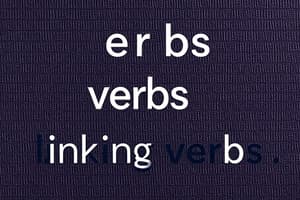Podcast
Questions and Answers
Which of the following is an example of a physical action verb?
Which of the following is an example of a physical action verb?
- consider
- believe
- run (correct)
- think
What function do linking verbs serve in a sentence?
What function do linking verbs serve in a sentence?
- To indicate a mental process
- To provide detail about the action
- To express an action
- To connect the subject to a complement (correct)
Which of the following verbs is a linking verb?
Which of the following verbs is a linking verb?
- become (correct)
- kick
- jump
- write
Identify the transitive verb in the following sentence: 'She kicked the ball.'
Identify the transitive verb in the following sentence: 'She kicked the ball.'
Which of the following sentences contains an intransitive verb?
Which of the following sentences contains an intransitive verb?
Which verb indicates a cognitive process?
Which verb indicates a cognitive process?
Flashcards are hidden until you start studying
Study Notes
Verbs
Action Verbs
- Definition: Verbs that express physical or mental actions.
- Types:
- Physical Action Verbs: Describe observable actions.
- Examples: run, jump, eat, write.
- Mental Action Verbs: Indicate cognitive processes.
- Examples: think, believe, consider, remember.
- Physical Action Verbs: Describe observable actions.
- Functions in Sentences:
- Show what the subject is doing.
- Can be transitive (require a direct object) or intransitive (do not require a direct object).
- Example:
- Transitive: She kicked the ball.
- Intransitive: He sleeps.
Linking Verbs
- Definition: Verbs that connect the subject of a sentence to a subject complement (often a noun or adjective).
- Main Linking Verbs:
- Be (is, are, was, were)
- Become
- Seem
- Functions in Sentences:
- Explain or identify the subject.
- Description: Help to describe a state of being or condition.
- Example:
- She is a doctor. (linking "is" to the noun "doctor")
- The soup tastes delicious. (linking "tastes" to the adjective "delicious")
Action Verbs
- Express physical or mental actions.
- Physical action verbs describe observable actions.
- Examples: run, jump, eat, write
- Mental action verbs indicate cognitive processes.
- Examples: think, believe, consider, remember
- Show what the subject is doing.
- They can be transitive (require a direct object) or intransitive (do not require a direct object).
- Transitive example: She kicked the ball.
- Intransitive example: He sleeps.
Linking Verbs
- Connect the subject of a sentence to a subject complement.
- Subject complement is often a noun or adjective.
- Main linking verbs:
- Be (is, are, was, were)
- Become
- Seem
- Explain or identify the subject.
- Help to describe a state of being or condition.
- Example: She is a doctor. (links "is" to the noun "doctor")
- Example: The soup tastes delicious. (links "tastes" to the adjective "delicious")
Studying That Suits You
Use AI to generate personalized quizzes and flashcards to suit your learning preferences.




